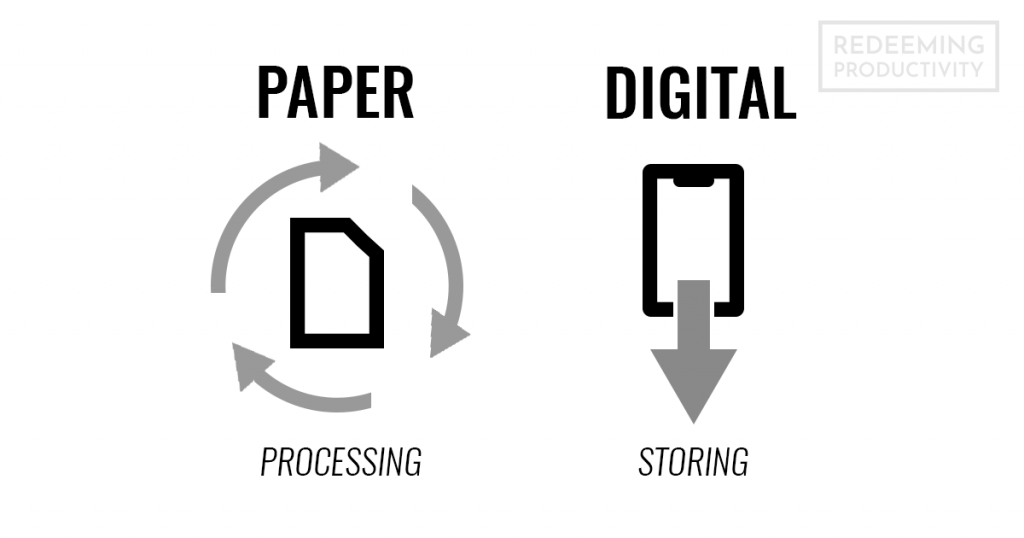Which is better for productivity, a paper planner or a digital app?
When it comes to productivity tasks like to-do lists, calendars, mind maps, and information storage, I have usually preferred digital tools. I really like my apps, software, and automation. But, I also understand that some people prefer to manage their life using some kind of paper planner. So, I gave it a shot.
Inspired by Emily Maxson’s post on the Bullet Journal, I undertook a 6-month experiment using a paper planner to manage the majority of my productivity efforts. This experience has led me to some conclusions about the pros and cons of paper and digital tools. And when it comes to digital versus paper, that’s exactly how the discussion should be framed: pros and cons.
I don’t think it is a question of either/or, but rather which/when. Remember, paper or pixel, these are merely tools. You don’t use a hammer to tighten a bolt. And likewise, I will argue, you shouldn’t use an app to try and breakdown a complex decision. The question should be, what are the strengths and weaknesses of each type of tool? Only then can we consider when it is best to use one or the other.
The Key Principle: Digital Is for Storing, Paper Is for Processing.
During my sojourn in the land of paper, I pondered exactly what I found useful about using my paper planner, and what things I missed about digital tools. Some things I much preferred doing in the planner, others I thought were more efficiently done in an app. But the more I considered it, the more those strengths and weaknesses clarified into a single principle:
Digital is for storing, paper is for processing.

Digital Is for Storing
When it comes to personal productivity the main strength of digital tools is in their ability to store information. More specifically, it’s in their ability to store, organize, and retrieve information.
Of course, a handwritten note can technically store information just as well as a computer. But the real issue is in the longevity of that storage and the ease with which you can retrieve that information when it’s needed. Here are just a few ways digital tools exceed paper in the realm of storage and retrieval of information.
Persistent Storage
One of the issues I kept having while using the Bullet Journal system was that even though I was on top of logging everything, managing long term tasks just gummed everything up. I’d have to transfer things from log to log, and if I wasn’t good about reviewing my planner weekly, things were forgotten. Also, the more things I put in the planner, the more I lost. I kept a good index, but I found myself missing the ability to do a quick CMD-F to find a specific note from a meeting.
With digital tools, everything is indexable and searchable. I can organize and reorganize it to my heart’s delight. And I have confidence that if I store it properly and my backups are running right, I have that piece of data stored and accessible forever.
Easy Accessibility
One massive annoyance about using a physical notebook to track my tasks, calendar, and other productivity-related matters is that I didn’t always have it on me. I tried to bring it everywhere, but paper notebooks are large and forgettable. They don’t fit in your pocket unless you’re wearing cargo shorts, but who wants to wear cargo shorts? Often, some task would pop up that I needed to capture, but my Bullet Journal was nowhere in sight.

For most people, digital tools are simply more ubiquitous than a single physical object like a notebook. I know that smartphones can become a distraction, but at least this is one benefit of never being without your phone—it also means you’re never without your reminders app, calendar, notebook, and more.
Plus, speaking of easy accessibility, all of my productivity-related apps sync across all of my devices. So, whether I’m sitting at my work computer, tapping away on my iPad, or out and about with my phone, my task list, calendar, and everything else is always with me, always up-to-date, and always accessible.
Reliable Reminders
Another area digital simply buries paper is in its ability to schedule reminders. They have yet to invent a notebook with an alarm on it, but my calendar and task tracking software both have ways of alerting me.
Take, for instance, when I need to remember to bring something to church 3 weeks from now. I put it in my reminders app, I schedule a notification for the night before so I can get it ready, and another for about an hour before I leave for church. Then, I forget about it for 3 weeks. Yet I have complete confidence I will do that task when it comes due because my system has a mechanism to remind me.
Can’t do that with paper.
But that doesn’t mean paper is good for nothing. I still use physical paper notebooks in my productivity arsenal and that’s because they have some benefits which are still unmatched by digital tools.
Paper is for Processing
Paper can still do things which digital tools can’t hold a candle to. Namely, paper great for processing.
This might sound counter-intuitive at first, since computers are made to, well, compute. But in terms of productivity, paper tools provide the best value in the way of thinking through things like decisions or tentative plans. In my view, paper is simply unmatched in how it aids processing. Of course, things like mind-mapping software exist, but I just don’t see the point. A nice pen and a piece of paper are much better for my creative juices. Here are a few reasons why I think that’s the case:
Paper is Disposable
I like using paper to plan or think through things precisely because it’s a poor mechanism for storing data. The transient nature of paper actually helps my paralysis of analysis. Knowing that whatever I jot down I’m not committing to some eternal digital archive gives me a freedom to think with fewer boundaries. I enjoy the crinkling up of a bad idea and throwing it in the garbage. Because paper is disposable, it makes it a better tool for processing.

Paper Slows You Down
The processing power of paper is aided by the fact that writing things out forces me to slow down. John MacArthur says the reason he uses a fountain pen to write out his sermons is not that it’s faster, but precisely because it makes him slow down. When he refills the pen from the inkwell he has a chance to think through what the passage of Scripture is teaching and how he should communicate it. I feel that benefit every time I try to put a concept into words in my notebook. Clacking on the keyboard enables me to write faster, but not more thoughtfully.
Paper Destroys Distractions
Paper also serves the act of processing because paper destroys distractions. Most paper stock does not come equipped with WiFi (they’ll figure it out soon, I’m sure). Research has shown that even just knowing that your phone or computer might interrupt you with a notification causes people to be less concentrated—not exactly ideal conditions for unraveling a complex problem. Paper isolates you from those distractions and thus helps you to process your thoughts better than you can with digital tools.
Conclusion
I’m not claiming that these conclusions are going to hold true for everyone. But maybe, just maybe, thinking through the advantages of paper and digital tools for yourself will help you to become more productive. I know technology is always shifting and with things like the advances in tablets and styluses the future seems bright for a confluence of digital and paper. But I’m not sure if the advantages of paper will ever fully merge into a digital equivalent. So, for now, I’m content to pick the best tools for each job. And I recommend you do the same.


Thanks brother! I’ve also gone back and forth, but hadn’t really thought through this question as you have. I’m an old-fashioned paper guy mostly – but sure am thankful for Digital reminders (except when the alarm goes off during a meeting: ). Appreciate your work! John Snyder, TMS 2000, TMAI 2000-2009
Hey, John! Thanks for the comment and the encouragement!
Enjoyed this one, Reagan.
Not to say I haven’t enjoyed the others, of course…you know what I mean.
Thanks, Allen!
Great article, I’ve come to the same conclusions! Also inspired by Emily’s wonderful article on bullet journalling.
Even writing with an Apple Pencil, which works great with the right apps, just isn’t the same as paper. Especially the point of disposability I wholeheartedly agree with.
Greetings from a law student in Germany! Enjoy your blog and podcast very much, praise the Lord for your ministry!
Thank you for the comment, Philip! I agree about the Apple Pencil. I have an iPad Pro with the Pencil, and like you said it really just isn’t the same.
Guten tag! Thanks for reading and listening.
I like using paper but when I travel (and I travel a lot), it’s very easy to lose. That’s why I prefer online tool, such as kanbantool.com . It’s convenient and I can use it everywhere, it’s very useful.
Revealing and insightful tutorials.
Most very grateful.
I can’t tell you how freeing your podcast on digital vs paper was to me. I love notebooks and journals but somehow I felt like I was cheating on my iPad. Your insights on using both rather than either or was spot on. Thank you
I’m so glad to hear that, Michelle!